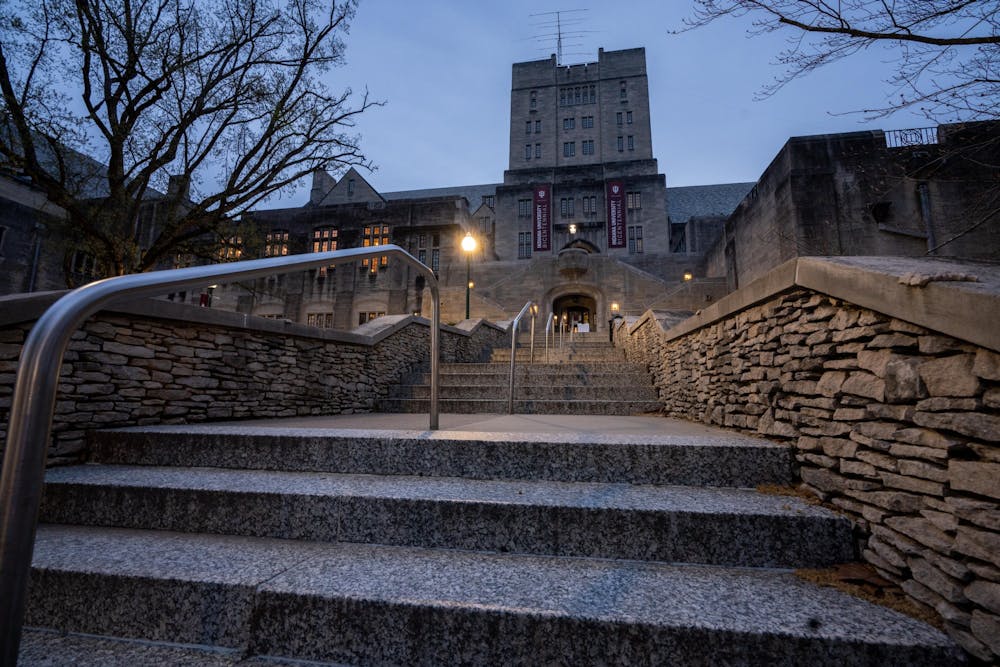President Michael McRobbie wrote Thursday to the IU community and laid out several potential fall plans for IU.
The paths that the fall 2020 semester may take range from another semester of classes entirely online to business-as-usual at IU’s campuses. However, McRobbie acknowledges that a more realistic scenario, and one the administration hopes to achieve, is a hybrid semester — one with both in-person and virtual classes.
This hybrid semester is one which is already being explored by other universities such as Purdue University. This news from IU represents a positive development for returning students.
A hybrid semester is no guarantee for this fall. But McRobbie and the IU administration have shown that getting students back on campus, in some capacity, is a priority.
More detail on how to achieve a hybrid semester is needed before students should feel satisfied. Fortunately, Purdue provides an in-depth example that IU should follow of how to aim for a hybrid semester this fall.
In an April 21 letter to the Purdue community, Purdue president Mitch Daniels stressed that Purdue was aiming for an on-campus fall semester and highlighted a number of precautions that could make such a situation viable.
Some of the precautions that Daniels said Purdue leadership is examining include testing students and staff for COVID-19 infections and immunity before they arrive on campus, using Purdue’s laboratories to expedite testing results and altering class schedules and sizes to reduce contact between students.
Daniels is one of a growing chorus of university leaders who are promoting alternatives to an entirely online semester.
Brown University president Christina Paxson made the case for on-campus classes this fall in a New York Times Opinion column last week.
“The reopening of college and university campuses in the fall should be a national priority,” Paxson wrote. “Institutions should develop public health plans now that build on three basic elements of controlling the spread of infection: test, trace and separate.”
Paxson advocated for consistent testing of all students at regular intervals in order to safeguard the community at large, which is possible at IU as well.
Daniels suggested using Purdue’s Biosafety Level 2 labs for testing. IU has access to Biosafety Level 2 labs, which could help facilitate similar campus-wide testing.
Students who test positive would then need to undergo contact tracing, the process of trained experts interviewing infected patients to determine who else may have been infected. Contact tracing at a university level is particularly challenging, as students may not know who they sit next to in class.
Private tech companies, such as Apple and Google, are developing apps to digitally trace the disease, and local governments are already on board. If IU can make us all install Duo Two-Step login, then getting students to participate in digital tracing schemes on campus is also possible.
Infected or exposed students will need to be isolated from the university community. IU has already used IU-owned off-campus houses to provide isolated living quarters for infected or exposed students.
Should the need for isolation outstrip the 23 beds already earmarked for quarantine purposes, IU demonstrated the capacity to secure alternative housing when Foster and McNutt dormitories were closed due to mold outbreaks and can do so again.
There’s no guarantee such measures would be sufficient in practice. The COVID-19 pandemic is a rapidly evolving situation, and it's extremely difficult to forecast what the situation will be in several months.
Several states are aiming to loosen social distancing guidelines through May, including Indiana. This is despite the fact that predictive models from the Centers for Disease Control and Prevention suggest loosening such measures will lead to increases in cases and deaths.
Dr. Anthony Fauci, director of the National Institute of Allergy and Infectious Diseases, told The Economic Club of Washington, D.C., on Thursday that, absent an effective coronavirus treatment, the U.S. “could be in for a bad fall.”
This is all to say that COVID-19 may still be serious enough that IU has to cancel in-person classes all semester, again. However, it may be the case that proper precautions make in-person classes, in some capacity, a viable option this fall.
Purdue has offered a thoughtful blueprint for a hybrid model — one that IU and McRobbie should follow.
Christian Sayers (he/him) is a senior studying mathematics and economics. He hopes to someday own a large rabbit.






